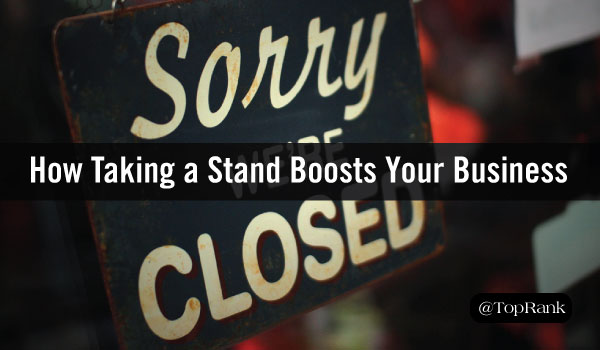
What do Home Depot, Ikea, Dillard’s and REI have in common?
They all will be closed for Thanksgiving this year, joined by dozens more major retailers. REI in particular will remain closed through Black Friday as well. On some of the biggest shopping days in the U.S., these retail giants are encouraging potential customers to stay home.
On the surface, it seems like a risky move. At worst, these brands risk losing customers to competitors, and at best they’re out a substantial chunk of sales revenue.
But major players in the industry don’t get that way by giving away money. They know that leading with their values is good for business. They saw Black Friday slowly encroach into Thanksgiving, and chose to support the idea that the holiday should be a day of rest, not a marathon of bargain-hunting.
As an early adopter, REI serves as a case study to the business power of leading with your values. The sporting goods retailer stayed closed on Thanksgiving and Black Friday in 2015, branding the initiative the Opt Outside campaign. The message was simple: Instead of shopping, go out and get in touch with nature. It was a potent idea, perfectly consistent with the brand’s core values. And the gamble paid off: REI saw a 9.3% increase in revenue, a 7% increase in store sales, and a 23% increase in digital sales for 2015.
It’s not just about choosing to close your business on a particular day, of course. It’s about broadcasting your brand’s values, and showing the courage of your convictions by following through on them. Consumers tend to favor that kind of boldness.
Here’s why leading with your brand’s values can be a boost to your marketing.
Differentiate Your Business
In the always-on digital world, a lot of the key differentiators brands used to rely on cease to matter. The hardware store downtown is open an hour later, so you shop there. The bank down the street always has extra tellers and shorter lines, so you choose to bank there. The local supermarket has the best deals on produce, so get your apples and bananas there.
Price and convenience are getting harder to compete on. One of the few remaining differentiators is what a brand stands for. TOMS shoes, Dove, Always and adidas are just a few brands using culture as a content marketing strategy. And the strategy is paying off – a recent study from Cone Communications found that 87% of consumers use values as a guide for making purchase decisions.
Define Your Audience
Some brands focus on pulling in the largest audience possible. To avoid turning off any potential customers, they avoid making controversial statements – and eventually statements of any kind. The problem is, “inoffensive” can quickly turn into “bland.” Sure, no one hates a bland brand. But no one loves them, either. And the worst part is, the majority of people that might be turned off by a brand’s values were likely never going to be customers in the first place.
When you lead with your values, you may turn away some people. But the trade-off is energizing the people who share your values, inspiring brand loyalty and ambassadorship. Starbucks is a perfect example of this phenomenon. When they announced they would hire 10,000 refugees, some people boycotted the brand. But a far larger group became more loyal, resulting in a net win for the company.
Inspire Your Employees
The people who work for your organization are the single largest underutilized marketing force you have. On average, employees tend to have ten times the connections on social media than the brand they work for. And people are more likely to trust messaging that comes from other people rather than a brand’s social accounts.
If you can inspire your employees to be brand ambassadors, you can be more credible to your existing audience and reach vast untapped audiences as well. Leading with your values is one way to give employees that inspiration. Communicate your brand values internally to make sure everyone shares the vision, then encourage employees to post on social media when they see those values in action.
Go Against the Flow
When some retailers started opening earlier and earlier on Black Friday – eventually cutting into Thanksgiving itself – most businesses followed suit. But a special few had the courage to lead with their values, buck the trend, and start a counter-movement, and their efforts have paid off. That kind of values-based marketing has proven to be a powerful differentiator, helping businesses find new audiences and inspire their employees to be brand ambassadors.
Whether you spend your weekend shopping or relaxing with family, come back to work Monday ready to put your brand’s values in action. Because values-driven, purpose-led marketing is something we all can be thankful for.
What’s your favorite story of a brand taking a values-driven stand? Let me know in the comments.


